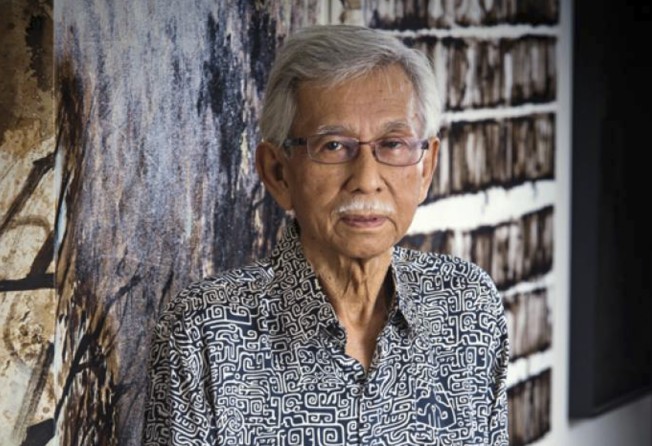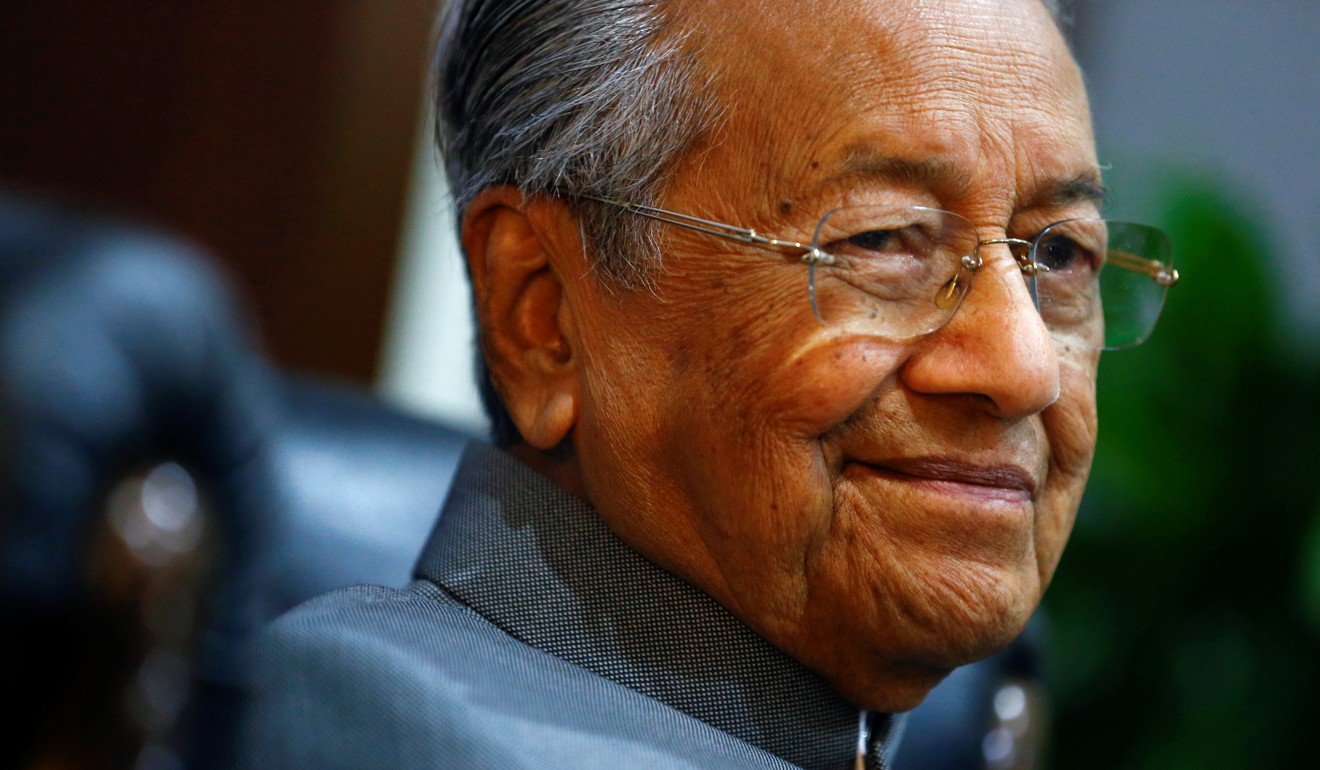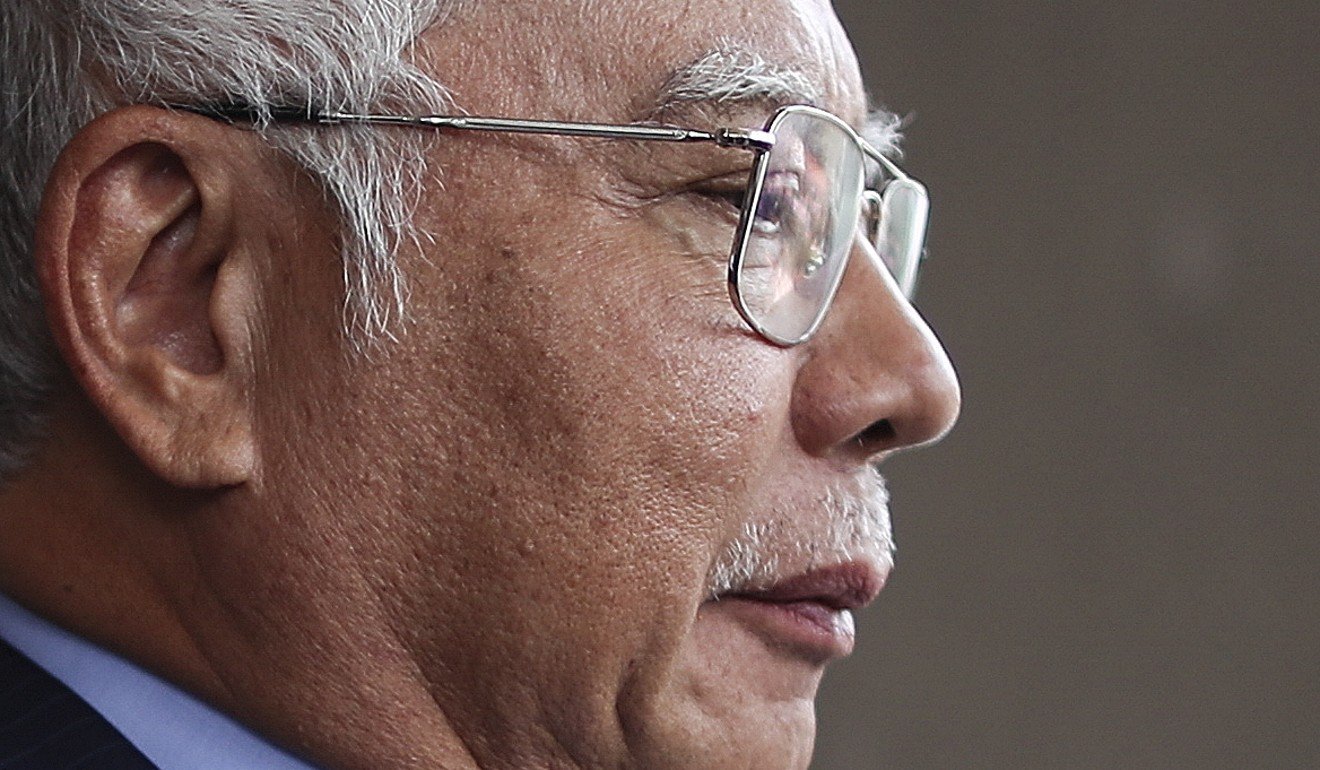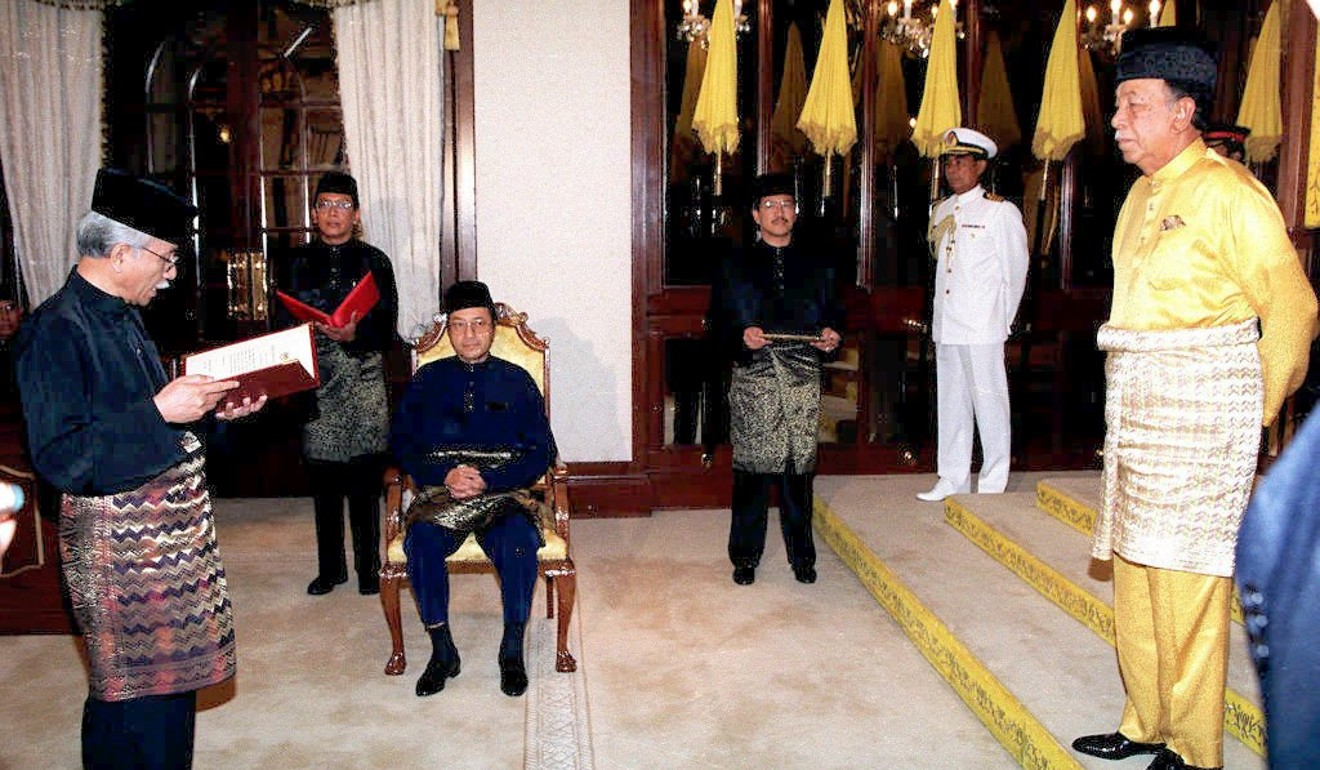Daim Zainuddin to ministers in Mahathir’s Malaysia: work with civil servants, ignore Najib, stop talking behind colleagues’ backs
- Prime minister’s trusted adviser says officials in power need to deliver on pre-election promises – and that PM-in-waiting Anwar Ibrahim is a ‘friend’
- This is the first in a series of three pieces on Daim. Tomorrow, he reveals his experience on the ECRL deal and dealing with fugitive financier Jho Low

Work with civil servants instead of distrusting them, stop dancing to the tune of critics, and avoid talking behind the backs of your colleagues.
Those are the top tips from Malaysian political grandee Daim Zainuddin, 81, for key lieutenants of Prime Minister Mahathir Mohamad ahead of the Pakatan Harapan administration’s first anniversary in power.
In an interview with the South China Morning Post, Daim said – amid rising public disquiet about the government’s purportedly languid style – that ministers urgently needed to level up to deliver on the lavish pledges they had made to win the election.
The coalition marks 12 months in power on May 10. On May 9 last year, the ragtag bloc led by 93-year-old Mahathir – the country’s ex-strongman leader – shocked the world as it staged a crushing election victory over the scandal-ridden administration of then-prime minister Najib Razak.
Approval ratings, however, have since plunged – with one think tank’s poll suggesting the public had doubts about the greenhorn government’s ability to steward the economy and manage the tinderbox of ethnic relations in the multiracial country.
In the hour-long interview, Daim, a close personal confidante of Mahathir, acknowledged the administration had its work cut out to clean up Malaysia’s vast financial problems – which Pakatan Harapan blames on Najib.
But one reason for slow reforms was ministers’ distrust of the Najib-era civil servants whom they had assailed while in opposition, he said.
“Now you are in government. When you are in government, you have to deliver. You cannot deliver by yourself, the civil servants are the implementers, not you,” Daim said. “You plan policies, then you say [to the civil servants], take over. You don’t trust them, they just sit down.”
The chairman of a special advisory Council of Eminent Persons set up by Mahathir soon after he was sworn in last year said some senior civil servants had been approaching him to discuss their friction with ministers and the outsize role political appointees were playing in the running of ministries.
“The civil servants have been coming to see me. They say oh, minister don’t trust me, OK … and they [political appointees] run the ministry,” said Daim, a lawyer turned businessman, who was roped in by Mahathir to serve two stints as finance minister in the 1980s and 1990s.

“How can they run the ministry? They are outsiders. I have been telling the ministers – the civil servants have been there since the British [colonial era]. When the British came here, they brought the civil service. And you try now to discard them? You cannot!”
Asked if the ministers had legitimate concerns that they could be sabotaged, Daim said: “That I don’t know. But you have to work with [the civil servants]. Without them … you are dead.”
He said civil servants by and large were likely to back the government of the day even though they had only served one political master before the polls.
He took particular issue with ministers’ “close advisers” – political appointees – whose main role in the past was taking apart Najib’s policies.
“Now what? Criticise your own government? You have to deliver, isn’t it? This is where the failure is.
“I have been telling them – you like it or not, there are 1.6 million civil servants. And we are paying them every day. Can you imagine? One, plus wife. Plus one child. [There are votes there, so get them onside or] you are in trouble. You know?”
Daim also had advice for ministers on how to deal with Najib, the disgraced ex-premier who is currently facing 42 criminal charges for his alleged involvement in the 1MDB financial scandal.
The former prime minister has emerged as the new government’s fiercest critic despite his legal woes.
On an almost daily basis, the ex-premier uploads multiple posts on social media attacking the Mahathir government.
Some have suggested the accounts – on Facebook, Twitter and Instagram – are professionally run.
Daim – tasked by Mahathir to renegotiate a deal with Beijing for the controversial East Coast Rail Link (ECRL) project, a multibillion-dollar development inked by Najib – has been in the cross hairs of the ex-premier over the talks. Najib has questioned the terms of the amended deal Daim signed up to, which reduced the price of the project by a third.

Asked by the Post if ministers needed to be on “attack mode” against Najib, Daim suggested this was not his preferred approach.
“Why must you dance to their tune? When Najib attacked me about the ECRL, what did I reply to him, what did I say?” he said, putting his finger to his lips to indicate his lack of response.
“I have the file with me, [it’s not his] now. I ask him questions, he dare not answer. Why must you listen to their tune? You got your agenda. You implement your agenda.
“You don’t implement, the rakyat [people] say, what are you doing? You made promises [but] you are still answering him. You just ignore him.”
He suggested public discontent with the year-old government may have to do with poor communication acumen among the ministers, most whom have never held executive office at the federal level.
Prior to the May 9 poll, the Pakatan Harapan coalition and its previous iteration, Pakatan Rakyat, had power in two of the country’s 13 states – Penang and Selangor.
He said while the public was “impatient” for quick reforms, ministers needed to go down to the ground to explain just why this was not possible.
“Go down and meet the people! People are reasonable, explain to them. Instead you stay away, scared that I cannot deliver my manifesto promises, don’t want to go and see them, they will scold me,” Daim said.
“You go. I have been going around the country, they say OK. They understand. They are reasonable. I am not member of any party, only I like to talk to people and say look – this is the real situation. Give it a bit of time.”

Speaking from his 60th-storey office in the Ilham Tower skyscraper in the heart of Kuala Lumpur, Daim also offered his views on the occasional public bickering that has broken out within the government in its first year.
While none of the disagreements have been particularly shrill, they have been used by Najib and his party, the United Malays National Organisation (Umno), to press home their view that the government is dysfunctional.
Daim said the formerly ruling coalition – the Umno-led Barisan Nasional – also took a long while to solidify after it came to power in 1957, upon independence from British colonial rulers.
The bloc, at that time called the Alliance, ruled Malaysia without interruption for 61 years until last year’s election.
“It takes time,” Daim said. “I think Mahathir has managed to bring them together. It will take time to gel.” He said ministers needed to stand by collective cabinet decisions after they were made, even if they disagreed. “Don’t go behind and say ‘oh, I don’t agree’. Don’t agree, resign lah,” Daim said.
“Show that this government is a serious government, a united government. You can have differences, you can express your views, but just because you have a view doesn’t mean you are correct.
“When the majority have made a decision, this is a democracy, majority decisions you follow. That is how governments are run. If not there will be chaos.”

The Post also asked Daim his views about Anwar Ibrahim, the putative successor to Mahathir under a coalition agreement signed before the polls.
Daim backed Mahathir during the prime minister’s nearly two-decade feud with Anwar, which began with Anwar’s sacking as deputy premier in 1998.
Mahathir quit Umno during Najib’s time in power to join the Anwar-led opposition, citing a need to topple the scandal-haunted premier at all costs. Daim, a long-time Umno stalwart, was sacked by the party weeks before last year’s elections after he campaigned in support of Pakatan Harapan.
In the interview, Daim reiterated his comments to the Post last year that he had no problems with Anwar or his eventual ascension to become prime minister.
He said he did not want to comment at length on politics because “I am retired and … I don’t want them to say I am interfering. So I don’t get involved”.
Asked if he had confidence in Anwar, Daim described the veteran politician as a “friend of mine” who was “on the phone with me all the time”.
“I am prepared to see how he is going to perform. That’s it. They have made a choice. He has to deliver. Whether he [is] as firm as Dr Mahathir, I do not know. These are different personalities, completely.”